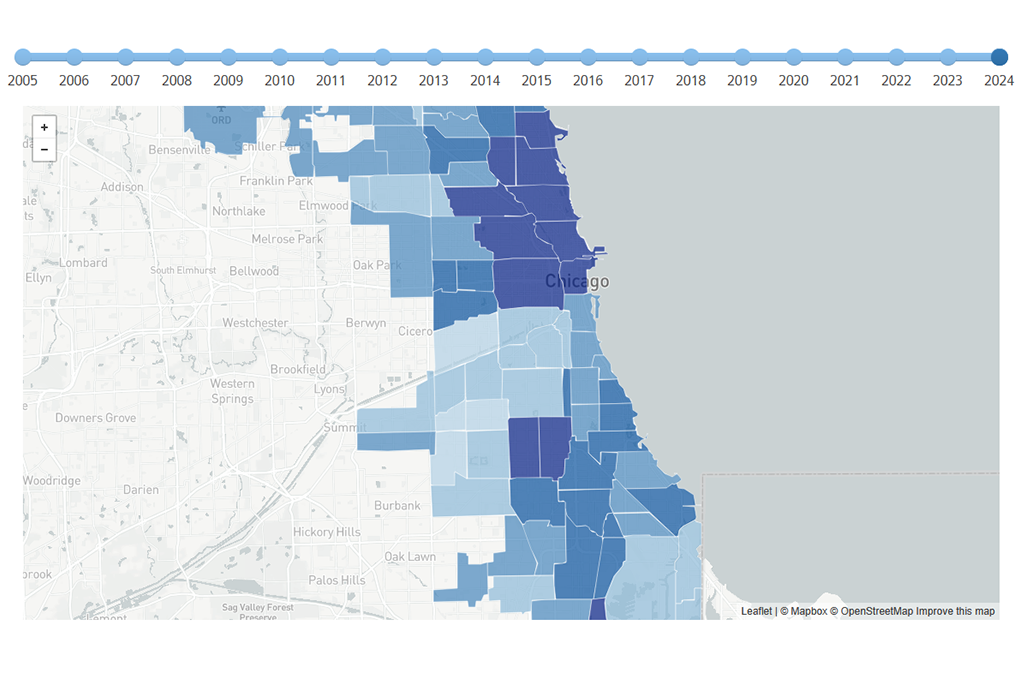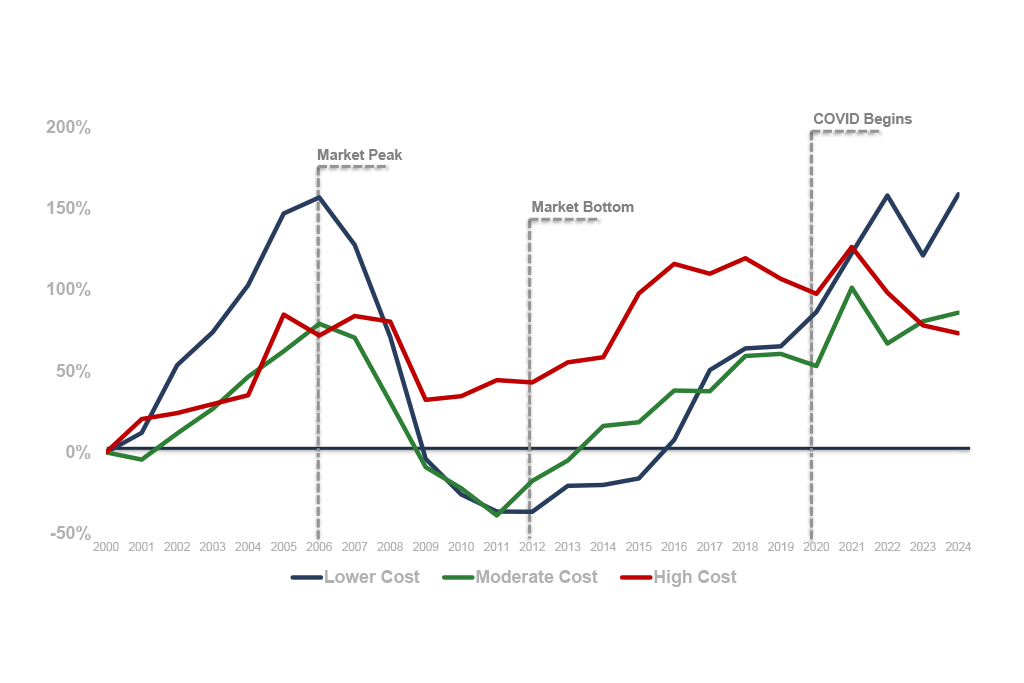Holiday wish lists might look a bit different this year, but when it comes to wishes for the housing industry on a grander scale, it’s little surprise what experts and local leaders hope to find under the metaphorical tree.
At the center of their concerns is a grim outlook at how the COVID-19 pandemic’s economic toll will affect housing insecurity. As job loss and economic hardship leave many unable to pay rent or mortgages, an August report found potential for the most severe housing crisis in U.S. history. If conditions do not change, up to 43% of renter households could be at risk of eviction by the end of the year.


But with the new year will also come a new administration. While Republican election challengers continue to fight in key battleground states won by President-elect Joe Biden, others are looking forward with hope to the incoming administration of Biden and Vice President-elect Kamala Harris — from first-time voters to immigrants.
The Tribune reached out to area housing experts and advocates and asked what they’d like to see from the new administration when it comes to the housing industry. This is what they had to say. (The following interviews have been condensed and edited.)
Andy Schcolnik, president of Southside Builders’ Association

“Many small- and medium-sized housing providers are getting destroyed by the eviction moratorium,” said Andy Schcolnik, president of the Southside Builders’ Association. “If the tenants are going to get relief, then the housing provider needs to get relief, in the form of subsidies or grants to make up for lost income.”
Schcolnik, whose not-for-profit organization unites professional builders, developers and others in the real estate industry around a mission to rejuvenate Chicago’s South Side, said it’s up to the government to take on the burden of supporting renters without harming landlords and housing providers.
One option he floated would be an expanded federal housing choice voucher program, which would cover more subsidized homes. A tenant pays a portion of the rent, depending on income, and the government covers the remainder.
“That has worked very well for us,” he said.
Raul Raymundo, CEO and co-founder of The Resurrection Project

Before the country can begin recovering from the pandemic, more help is needed to repair the damage left by the Great Recession a decade ago, Raul Raymundo said.
“The recovery from the Great Recession has been completely unbalanced,” he said. “We’ve had a boon in certain communities — appraisals, value of properties going up. But low-income communities, particularly Black and brown communities? They’re still underwater.”
The Resurrection Project is a nonprofit based in Pilsen and aims to build wealth in neighborhoods through connecting residents with low-interest loans and building affordable housing.
Homeownership, Raymundo noted, is a key way for working families to advance. He hopes to see more initiatives from the Biden administration to further that mission.
“We need to figure out how,” he said, “so we can rebuild these communities of color that have been left behind.”
Geoff Smith, executive director of the Institute for Housing Studies at DePaul University
Early in the pandemic, research from the Institute for Housing Studies at DePaul University painted a bleak picture of how the virus could disproportionately harm lower-income renters.
Due to the higher rates of Black Americans dying from COVID-19, higher risk for seniors and the economic impact on low-wage earners more vulnerable to layoffs, the institute found that the pandemic would have greater impact on renters of color and those who were already financially burdened.
“The current crisis will only destabilize them further,” said the institute’s executive director, Geoff Smith. “Without additional federal action, the situation could become even more dire.”
Rental housing assistance for those impacted by COVID-19 should be a top housing priority for the incoming administration, he said. The institute, which provides research and data to inform affordable housing policy and practice, has continued to monitor the pandemic’s impact on housing, both in Chicago and on a larger scale.
“There are many different ways that rental housing assistance could be structured,” he noted. “But at the end of the day, this type of program not only helps people stay housed, but also supports landlords, many of whom are also struggling.”
Audra Wilson, president and CEO of the Shriver Center on Poverty Law
The conversation around rent relief should focus on how the interests of tenants and landlords are aligned, said Audra Wilson, who became the first Black female president of the Shriver Center on Poverty Law in June. The anti-poverty organization promotes racial and economic justice.

“Our biggest concern right now is that we’re heading for a huge housing crisis that’s characterized by possibly even higher eviction rates than we saw during the Great Recession,” she said. “The federal government needs to act more like an insurer and pick up the slack because, by definition, there’s no market solution here.”
While both the local and federal governments have enacted various moratoriums on evictions related to COVID-19, back-owed mortgage payments and rent will still come due once those measures are lifted, potentially leading to mass evictions at the tail end of the pandemic.
Private mortgage banks can afford to bear the burden easier, as they’re often insured against such losses, Wilson said. Reducing or forgiving mortgage payments would keep landlords and homeowners from risk of foreclosure, making it easier for housing providers to, in turn, forgive rent debt.
“That’s definitely something we could advocate for,” she said.
Bob Palmer, policy director for Housing Action Illinois
Before the Biden administration can move forward with new policies, Housing Action Illinois policy director Bob Palmer said he wants to see it reverse some administrative rules put forth by outgoing President Donald Trump.
Among them, Palmer said the weakening of the federal disparate impact rule — which provides recourse for marginalized people denied equal access to housing — should be halted. The Affirmatively Furthering Fair Housing rule, dedicated to eradicating segregation in cities and suburbs, should also be revived, he said.
He also hopes one pending Housing and Urban Development rule, which would bar families with a mix of immigration statuses from public housing and require immigration screening for all household members under 62 years old, will not be finalized by the end of Trump’s term.
But there’s still plenty more to be done, said Palmer, whose work focuses on expanding the availability of quality affordable housing.
“It’s pretty simple — build more housing, particularly for people with the lowest incomes,” he said. “Help people pay their rent or their mortgage by increasing their incomes or financial assistance, and encourage or mandate communities that don’t want to accept affordable housing to do more to overcome those barriers.”
Ahmadou Dramé, housing and community development manager at the Metropolitan Planning Council
Although eviction and foreclosure relief eventually surfaced amid the pandemic, the government should enact legislation that would automatically trigger such programs during national crises like COVID-19, said Ahmadou Dramé.
In his role as housing and community development manager at the Metropolitan Planning Council, Dramé helps the nonprofit advocate for more equitable communities in Chicago through better transportation, housing and community initiatives.

Outlining his vision for the next four years, Dramé also called for the Affirmatively Furthering Fair Housing rule to be reinstated.
“There is a whole host of other things that they need to do around fair housing, but that one in particular needs to happen immediately,” he said.
There are upgrades to affordable housing tools that would allow the expansion of housing stock and preservation of what exists already, but there’s another issue Dramé would like to see addressed: housing for people who have criminal records or were formerly incarcerated.
“A bunch of housing programs that are intended to help people who are transitioning between stages in life — and people who are particularly at risk of homelessness — have been written in such a way that a person who was recently released from prison couldn’t take advantage of the programs (and) couldn’t live in housing that is supported by (them),” he said.
Bill Eager, Midwest senior vice president for Preservation of Affordable Housing
Any approach to helping people stay housed should be multifaceted, Bill Eager said. The senior vice president of Midwest real estate development for the national nonprofit Preservation of Affordable Housing proffered a legislative agenda for the new administration that he said fits the bill.
Among the initiatives would be a scaling up of the federal government’s program that provides loans, tax credits and construction financing for affordable housing for seniors, to meet the coming wave of aging baby boomers.
Eager also calls for an expansion of tax credits for affordable housing developers with the passage of bipartisan legislation, and restoration of the Community Reinvestment Act, a major driver of private investment in affordable housing that impels banks to do more to correct historic disinvestment in low- to moderate-income communities.
“As for short-term items to focus on, it’s critical now that people have resources to pay their rent and stay housed,” he said. “The enhanced unemployment benefits in the initial stimulus package were very important in that regard, so we would like to see more of that in the short term.”
Gregory Brown, senior vice president of government affairs for the National Apartment Association
There is an urgent need for more affordable housing, said Gregory Brown, senior vice president of government affairs for the National Apartment Association.
“The number we typically use is north of 300,000 new units (per year) that have be produced to keep up with demand,” he said. “I don’t think we’ve hit that number more than twice in over 20 years. And so we are way behind.”
There’s a national shortage of housing stock in general, which doesn’t help matters, said Brown, whose Arlington, Virginia-based organization advocates for landlords and other housing providers.
“We need a lot more housing that would make everything more affordable,” he said. “Obviously, the more supply you have, rents can fall, and we can get a more balanced stock of housing available.”
Nykea Pippion McGriff, president of the Chicago Association of Realtors

Supply is also on the mind of Nykea Pippion McGriff, the first Black female president of the Chicago Association of Realtors. Tax credits for home construction could be a remedy to the shortage, she said.
“For the last three years, we’ve been behind on new home construction starts,” she said. “What Chicago is laser-focused on is that affordable housing component — and making sure that it’s something that developers will be incentivized to actually build.”
There is excitement surrounding Biden’s proposal to offer a $15,000 tax credit to first-time homebuyers, she said. It would help not only with homeownership rates in general, but specifically for people of color who have systemically been denied a fair shot at owning a home for generations.
“We still have to talk about supply, because stimulating demand — meaning creating additional buyers without addressing the supply — is going to impact the median sales prices,” she said. “We need President Biden to address the supply issue.”
Jeffrey Baker, deputy CEO of Illinois Realtors
Over the summer, aid like the Paycheck Protection Program and Economic Injury Disaster Loans worked well at helping people through the pandemic, said Jeffrey Baker, deputy CEO of the trade organization Illinois Realtors.
Extending such programs in 2021 with another federal stimulus package would go a long way in “getting us through this COVID tunnel,” he said.
“It would be great if there was some state and local aid included in there that could be tied directly to housing support,” Baker added. “The housing industry in Illinois on a yearly basis makes up roughly 15% to 16% of our state product. So recognizing that has to be addressed in any sort of relief package.
“Long term? I think we have to wait and see what (Biden’s) plans are with regard to tax policy.”
Susan Popkin, Urban Institute fellow
Even if federal housing assistance was expanded, there isn’t enough housing stock to satisfy the need, said Susan Popkin, a fellow in the Metropolitan Housing and Communities Policy Center at the Urban Institute, a Washington, D.C.-based think tank that carries out economic and social policy research.
“There’s a lot of talk about a universal voucher program in housing and entitlements, which would be a game changer for family homelessness, but you still have the problem of there not being enough places for people to rent,” Popkin said. “So we need to push both on the supply side and on the increased assistance side.”
Funding could go toward replacing tens of thousands of public housing residences lost between the ’80s and now, whether it be with new construction or renovating older buildings, she said.
“I’d like to see them built in a thoughtful way that doesn’t repeat the mistakes of the past,” she said.


